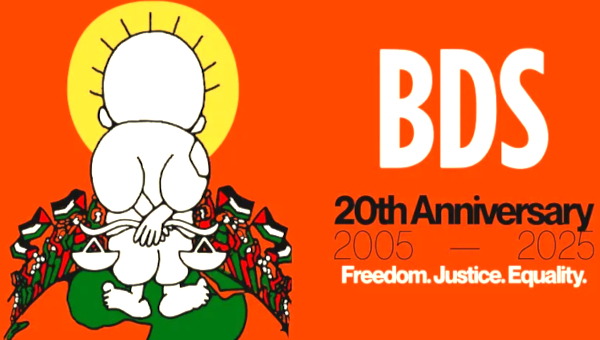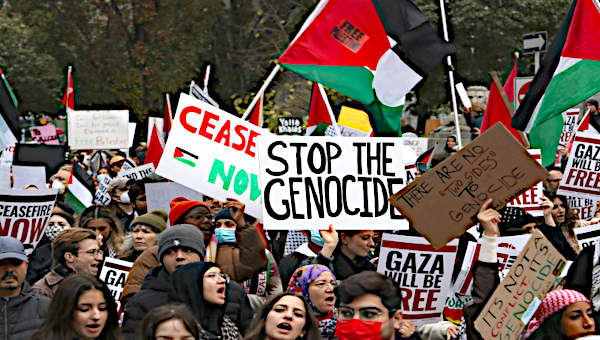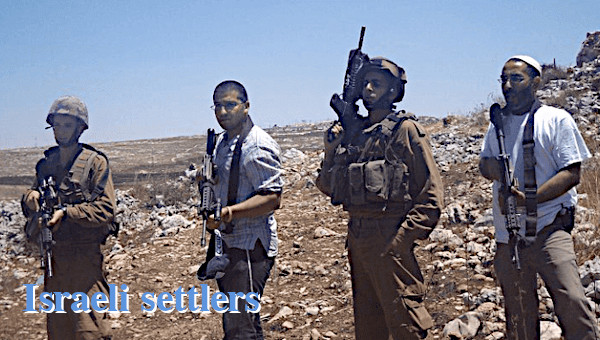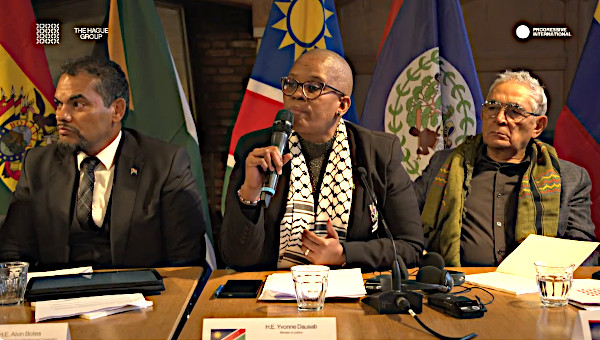Attacking Palestine’s Future
Traveling across Palestine, as I did to give lectures earlier this year, means following a perpetually fresh trail of repression. Omnipresent are the prison guard towers, the barbed wire, the Israeli soldiers with their massive guns and the separation wall.
The day before an event at which I was speaking in Beit Sahour, a small town adjacent to Bethlehem, residents held a funeral for Sajid Mizher, a 17-year-old volunteer medic Israeli soldiers had just shot dead in Dheisheh refugee camp despite his wearing an identifying vest.
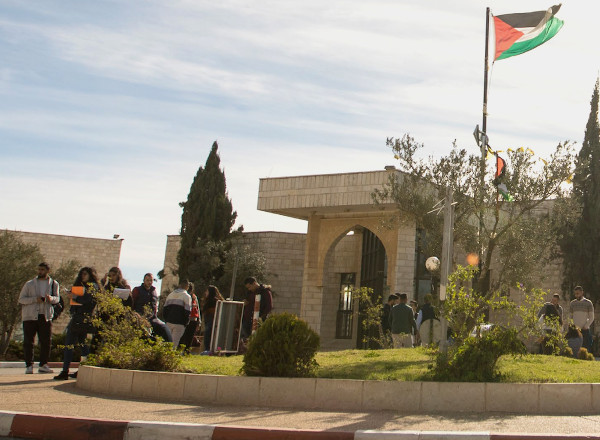
The night before my talk at Birzeit University near Ramallah, a group of undercover Israeli forces broke into its campus and kidnapped three Palestinian students. Persecuting students in this manner is part of a larger pattern as is Israel’s routine killing and maiming of Palestinian children, 44 of whom it shot on 25 October in Gaza.
The implications of these abductions and shooting sprees go beyond the direct physical and psychological harm to victims themselves and the agony and fear Israel inflicts on Palestinian families and communities.
As UNICEF points out, violence against Palestinians poses “daily challenges and threats to the fulfillment of children’s rights. Violence against children in all its forms is of serious concern, as it compromises children’s learning and future potential.”
Targeting the Future
This gets to the core of the logic of settler colonialism, which ultimately rests on the colonizer undermining the colonized’s capacity to develop independently. A key component of this is keeping colonized youth from having the best possible education, thereby hampering their ability to contribute to their society’s future economic, cultural and scientific flourishing.
Israel’s treatment of Palestinians, which involves undercutting their right to education in manifold ways, is a case in point. The most brutal way to stop children from being educated is of course to murder them. From the beginning of 2008 to late October 2019, Israelis have killed 1,234 Palestinian children.
But Israel’s expansive carceral regime also keeps Palestinian kids in jails and courts rather than classrooms. Each year roughly 500-700 children are detained and prosecuted in Israel’s military court system. Of 205 children in Israeli military detention in 2019, 24 are in solitary confinement.
Actual education options, meanwhile, are tailored to location. Palestinians citizens of Israel do not enjoy the same caliber of education as their Israeli counterparts. Pupils at the largest Palestinian high school in the Tel Aviv-Jaffa area, for instance, teach and study in conditions of extreme overcrowding.
Nof HaGalil, formerly Nazareth Illit, is home to some 2,600 Palestinian students but no Arabic-language state school. Students are instead forced to travel to other towns or villages, while their Jewish neighbors study almost exclusively in state educational facilities in the city.
The former mayor of Nazareth Illit, Shimon Gapso, has said that he refused to establish a Palestinian school in order not to harm the “Jewish character” of the city.
Palestinians applying for higher education are also at a disadvantage under the Benefits for Discharged Soldiers Law, which allows schools to consider military service when determining applicants’ eligibility for financial assistance. Since Palestinians do not serve in Israel’s army, this law allows discrimination against Palestinian students seeking financial aid.
Israel’s repression of the political rights of Palestinian citizens of Israel also functions as suppression of their right to education. The Nakba Law, for instance, strips state funding from any public institution that commemorates the 1948 ethnic cleansing of Palestine, including schools.
This means that Palestinians’ have to choose between maximizing the resources available to them to educate their young or teaching their next generation about the enormity of the crimes committed against their people in 1947-48 that have been a constitutive element of Palestinian life ever since.
Education Under Occupation
Israel’s routine denial of the right of Palestinians to free movement in the occupied West Bank also impinges on their right to education. When the International Court of Justice issued its 2005 advisory opinion on the illegality of Israel’s separation wall, it noted that the wall “illegally impedes the exercise of Palestinians’ right to education by cutting off teachers and students from their schools in East Jerusalem.”
In building the wall, Israel also took at least 200 dunams of land from the Palestine Technical University – Kadoorie, in Tulkarm in the northern West Bank.
The UN has pointed out that safe access to education in the West Bank is limited by “threats of [housing] demolition, clashes on the way to school between students and security forces, teachers stopped at checkpoints and violent actions of Israeli forces and settlers on some occasions.”
During 2018 alone, the education of more than 19,000 children in the West Bank, including East Jerusalem, was interfered within these ways.
School demolitions are worth highlighting too. In 2018, Israel demolished or seized five schools in the West Bank and 50 more are facing threats of demolition.
The Israeli military also confiscated 23 dunams of land from the technical university in Tulkarm even though it lies in Area A of the West Bank and should fall under full Palestinian jurisdiction as per the Oslo accords [a dunam is 1,000 square meters].
The military uses this area for training, which means that Palestinians who study and work at the school must do so amid shows of force by their oppressors.
Impoverish, Isolate and Terrorize
Israel makes it exceedingly difficult to secure permits to build new schools or colleges. In Area C of the West Bank, which comprises more than 60 per cent of the territory and is under full Israeli security and civil control, building restrictions have thus created a shortage of physical infrastructure for schooling.
Israel’s illegal settlement building also has widespread ramifications for Palestinian education.
The settlement of Beit El, for instance, near Ramallah, has dramatically impacted life for some 2,000 students at two UN-run schools in the nearby Jalazone refugee camp, because the Israeli military has imposed several arbitrary restrictions. Because of the settlement near the camp, Israel established a permanent military presence in the area. The Israeli military refused to allow the addition of a third floor to the boys’ school, leaving it with too few classrooms.
Israel made UNRWA, the agency that looks after Palestinian refugees including their education needs, put settlement-facing windows in both schools flush with the ceilings and of restricted width. The consequence was insufficient light and airflow in classrooms.
During the frequent conflicts between the Israeli occupiers and Jalazone residents, the Israeli military uses tear gas, rubber-coated metal bullets and sometimes live fire.
On top of the casualties and fatalities, these Israeli actions cause, tear gas is a health hazard, especially for minors, so schools often have to close.
Isolating scholars and students from their colleagues around the world puts the quality of education at West Bank post-secondary institutions at risk and potentially jeopardizes Birzeit University’s ranking as among the world’s top 3 per cent of universities.
Israel also frequently terrorizes Palestinian university students, professors and staff, by carrying out violent raids on campuses. The raid that took place the night prior to my Birzeit engagement was hardly an isolated incident.
In 2015, for instance, Israel used tear gas and ammunition in raids on Al-Quds University in Abu Dis and the Palestine Technical University-Kadoorie in Tulkarm. In early 2016, approximately 100 members of the Israeli military attacked Birzeit, seizing and damaging property.
When Donald Trump recognized Jerusalem as the capital of Israel in December 2017 and announced plans to move the US embassy there, students at Palestine Technical University protested and fought with Israeli forces. Subsequently, Israeli soldiers entered the campus and dispersed the protesters with stun grenades, tear gas and rubber-coated metal bullets.
The Israeli military deployed the same weapons on two occasions in the months that followed, patrolling the main entrance all day every day and routinely harassing students, arresting 12 of them and shutting down the school for two days.
Furthermore, according to Birzeit, 14 of its students were detained in July and August this year.
Completing a university education is challenging under even the most hospitable conditions. Imagine how much more difficult it is if one is at risk of being attacked on campus or whisked away in the middle of the night and then held indefinitely without charge or trial.
Or how difficult it is to teach under these circumstances. In September, Israeli forces raided the home of Widad Barghouti, a professor of media studies. She remains in detention without charge.
Israel’s refusal to grant visas for international scholars to work at West Bank universities and its unwillingness to renew visas for foreign academics already there, moreover, have deprived students opportunities to learn from experts in their fields. It has kept Palestinian scholars from collaborating with their peers.
Extraordinary Deprivation
The extraordinary deprivation and violence to which Israel subjects Gaza necessarily entails denying Palestinians there the best possible education, or indeed almost any.
During the Great March of Return demonstrations that began on 30 March 2018, Israel has killed 46 and wounded more than 4,600 children, 2,000 of them with live fire.
Such an enormous number of casualties, noted the UN, “strongly affect the emotional and psychosocial wellbeing of students, teachers and their communities.”
Between 2008 and July 2019, Israeli attacks on Gaza have displaced more than 190,000 children.
Israel’s 2014 attack on Gaza alone killed 60 teachers and injured 108 more while damaging 1,175 education facilities, totally destroying 29 of them.
Unsurprisingly, students who have been driven from their homes, who are under constant direct or indirect threat of violence or whose teachers have been murdered are not ideally situated for learning.
The devastating humanitarian crisis that Israel’s siege creates for Palestinians in Gaza also affects education. The blockade deprives Palestinians of access to water and sanitation, which makes it difficult to run schools properly.
The effects of poverty and fuel restrictions, directly attributable to the blockade, severely impede students’ ability to reach school or concentrate on studying. Sweeping restrictions on people’s movement prevent students from traveling abroad for education.
The Palestinian capacity as teachers and learners are unlikely to be fully realized when they work in discriminatory, run-down conditions, and under the omnipresent threat and actuality of violence from Israeli forces.
Indeed, that’s the point. Settler-colonial projects, like Israel’s, hamstring the colonized’s education in order to try to make them weak and dependent. That, in turn, weakens the ability to resist and undermines aspirations for national self-determination. The academic world – along with everyone else – should understand this and act accordingly.
When my colleagues or I from around the world visit Palestine to discuss our research with our Palestinian peers and with Palestinian students, the extraordinarily bright people with whom we speak should be able to carry out intellectual inquiry as freely as anyone else. That can only happen in the context of their liberation from colonialism. It’s incumbent on scholars and students living outside to support that. •
This article first published on the ElectronicIntifada.net website.


